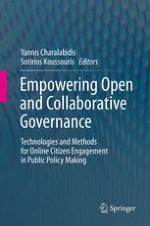2012 | OriginalPaper | Buchkapitel
11. Open Collaboration in Policy Development: Concept and Architecture to Integrate Scenario Development and Formal Policy Modelling
verfasst von : Maria A. Wimmer, Karol Furdik, Melanie Bicking, Marian Mach, Tomas Sabol, Peter Butka
Erschienen in: Empowering Open and Collaborative Governance
Verlag: Springer Berlin Heidelberg
Aktivieren Sie unsere intelligente Suche, um passende Fachinhalte oder Patente zu finden.
Wählen Sie Textabschnitte aus um mit Künstlicher Intelligenz passenden Patente zu finden. powered by
Markieren Sie Textabschnitte, um KI-gestützt weitere passende Inhalte zu finden. powered by
